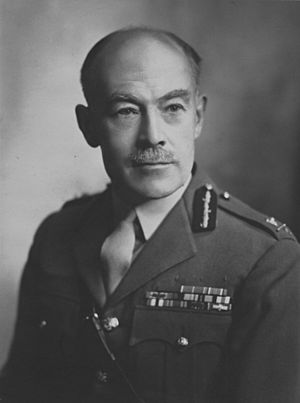Basil Davey facts for kids
Quick facts for kids
Basil Davey
|
|
|---|---|

Maj Gen Basil Davey; Commandant, The Royal Military College of Science, Shrivenham (1953)
|
|
| Birth name | Basil Charles Davey |
| Born | 21 November 1897 St. Lawrence, Jersey |
| Died | 20 November 1959 (aged 62) Russell Square, London |
| Place of burial |
St. Lawrence's churchyard, St. Lawrence, Jersey
|
| Allegiance | |
| Service/ |
|
| Years of service | 1916–1954 |
| Rank | Major-General |
| Service number | 14351 |
| Commands held |
|
| Battles/wars | |
| Awards | |
| Other work |
|
Basil Charles Davey was a highly respected British Army officer. He reached the rank of Major-General. He was known for his engineering skills during World War II. He helped armies cross rivers and other tough obstacles. Later, he led the Royal Military College of Science.
Early Life and Military Start
Basil Davey was born on November 21, 1897. He went to Blundell's School and then to the Royal Military Academy, Woolwich. This academy trains future army officers. He also studied at Jesus College, Cambridge.
In 1916, at age 18, he joined the Royal Engineers. This is the part of the army that builds things. He fought in World War I and was recognized for his bravery. After the war, he served in India. He was promoted to captain in 1926.
In 1930, Captain Davey became an instructor in Canada. He taught engineering at the Royal Military College of Canada. After returning to England, he was promoted to major in 1936.
World War II Service
When World War II began, Basil Davey was a key engineer. He was the Chief Royal Engineer for the 6th Armoured Division. He served with them in Algeria and Tunisia in North Africa.
He was promoted to lieutenant colonel in 1942. He then helped plan the Allied invasion of Sicily. This was a major operation to invade the island of Sicily. For his excellent work, he received the award of Commander of the Order of the British Empire.
Later, his unit, XXX Corps, moved to England. They prepared for the Normandy landings. This was the huge D-Day invasion of Europe. Davey remained their Chief Engineer. He helped the troops cross the Seine River. He also played a big part in Operation Market Garden. This was a daring plan to capture bridges in the Netherlands.
In 1945, he went to Italy. He became the Chief Engineer for the 8th Army. He helped the British forces advance into Austria. He was promoted to colonel. The United States also honored him with the Legion of Merit award.
After the War
After World War II, Basil Davey continued his important work. In 1948, he became the leader of the Royal School of Military Engineering. This school trains army engineers. He was promoted to brigadier in 1949.
In 1951, he received another high honor, the Order of the Bath. He then became the Commandant of the Royal Military College of Science. This college teaches science and technology to army officers. He was promoted to major general in 1952.
Major-General Davey retired from the army in 1954. He moved back to Jersey, where he was born. There, he served as a Jurat. A Jurat is a special judge in the Royal Court of Jersey.
Family Life
Basil Davey married Enid Sanford Tudor Tudor in 1926. They had four children. Two of their children followed him into the army. His grandson, Lt Col Dominic Davey, commanded a famous cavalry regiment. His granddaughter, Lt Col Colette Davey, is a senior medical officer in the army. This shows a strong family tradition of military service.
Sources
- Obituary of Major-Gen. B.C. Davey, The Times, Monday, 23 November 1959 (pg. 16; Issue 54625; col C)
- Royal Engineers Museum, Royal Engineers and Operation Market Garden (1944), Extracted 8 October 2009
- Generals of World War II
| Military offices | ||
|---|---|---|
| Preceded by Bryan Godfrey-Faussett |
Commandant of the School of Military Engineering 1948−1951 |
Succeeded by C. E. A. Browning |
| Preceded by John Eldridge |
Commandant of the Military College of Science 1951−1954 |
Succeeded by Edwyn Cobb |

